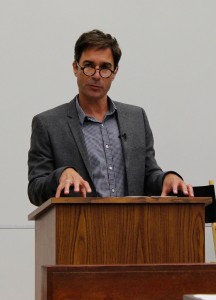Panel discusses mental health education
The USC Gould School of Law and the Saks Institute for Mental Health Law, Policy and Ethics hosted a panel on Wednesday to discuss mental health in college for the Institute’s Fall lecture, “In Real Life and as Seen on TV: Stories of Mental Health on Campus.”

In character · Actor Eric McCormack, of the television show Perception, spoke about his experiences portraying a doctor with a mental illness. – Jessica Magana | Daily Trojan
Panel members included Jessie Close, a mental health activist; actor Eric McCormack, who plays a neuroscience professor with paranoid schizophrenia in the television show Perception; Gould School of Law professor Elyn Saks and Gould student Sam Brown.
Close and Brown, who are diagnosed with bipolar disorder, and Saks, who lives with schizophrenia, shared their personal experiences with their diseases, ranging from their first hospitalizations to how the disease has affected their relationships.
Though McCormack does not battle a mental illness, he spoke about what he has learned from playing a character that struggles with his disease and does not take medication. McCormack said that playing the role of Dr. Pierce made him more aware of the problem that the stigma of mental illness causes in our society.
When McCormack landed the role of Dr. Pierce, he read Saks’ autobiography, and then sought her out to learn more about what life is like living with schizophrenia.
“The stigma of mental illness is a result of ignorance,” he said. “People fear and despise what they don’t understand, and the media only discusses mental illness after a mass shooting, which only increases the fear.”
Panelists spoke about the idea that college is a crucial time for those who are struggling with mental illness. Symptoms of mental illness might first appear due to the stress and pressures that can come with college. For this reason, Saks said it is imperative to raise awareness of these symptoms.
“We do sex education, driver education. Why don’t we do mental [health] education so we know what the signs and symptoms are?” Saks said. She went on to share that she experienced some of her worst schizophrenic episodes while she was at Oxford University and Yale Law School.
Brown, now a third year law student, was diagnosed with bipolar disorder when he was 18, soon before he was supposed to move from Chicago to Los Angeles to attend his freshman year at UCLA. Once at UCLA, Brown said he felt strong support from his community.
During Brown’s third year at UCLA, he experienced his second psychotic break, and it was his fraternity brothers who brought him to the hospital. It was this sense of community that was essential for him to have a successful college experience.
Close, who said she did not come to terms with her illness until she was about 50-years-old, did not have as stable a support system during her college years. She spoke about dropping out of high school, and later going to community college and then American University despite doubts from her family that she would succeed.
“If you live with mental illness, take care of yourself, keep pushing, stay in school and don’t give up,” Close said. “You have to try, try, try again.”
Despite Brown and Close’s different experiences confronting bipolar disorder, both said they have felt the stigma associated with mental illness. For Brown, this moment came after his second hospitalization when he was not asked back as an employee at a summer camp.
“It was then I realized that being tight-lipped about being bipolar wasn’t the worst,” he said.
Saks also spoke about the self-stigma associated with mental illness, which is something that she struggles with herself. She and McCormack agreed that teaching empathy is important in erasing the stigma attached to mental illness.
“It’s hard to teach empathy, but we’re in a good place to do that when everyone is here for higher learning and higher understanding,” McCormack said.

